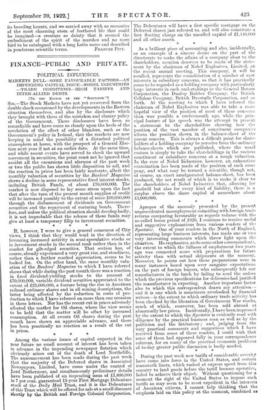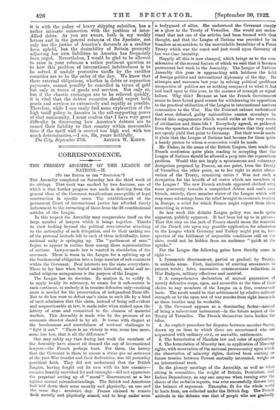FINANCE—PUBLIC AND PRIVATE.
POLITICAL INFLUENCES.
MARKE'1S DITLL—SOME FAVOURABLE FACTORS—AN IMPENDING CAPITAL ISSUE—NOBEL INDUSTRIES —TRADE CONDITIONS—HIGH TARIFFS AND INTER-ALLIED DEBTS.
[To THE EDITOR OT THE " SPECUTOR."] Sm,—The Stock Markets have not yet recovered from the double shock occasioned by the developments in the Eastern situation themselves, and also by the disclosure which they brought with them of the mistaken and clumsy policy of the Government. These disclosures have been so remarkable and have come so closely upon the heels of the revelation of the effect of other blunders, such as the Government's policy in Ireland, that the markets are now keeping in mind the possibility of a disturbed political atmosphere at home, with the prospect of a General Elec- tion next year if not at an earlier date. At the same time, and while recent events have served to check the upward movement in securities, the point must not be ignored that amidst all the excursions and alarums of the past week or two the public has shown little disposition to sell, and the reaction in prices has been fairly moderate, albeit the monthly valuation of securities by the Bankers' Magazine shows a decline in some representative fixed interest stocks, including British Funds, of about 170,000,000. The market is now disposed to lay some stress upon the fact that after the turn of the present month supplies of credit will be increased possibly to the extent of some £60,000,000 through the disbursement of dividends on Government securities and the repayment of maturing bonds. There- fore, and unless the political situation should develop badly, it is not improbable that the release of these funds may give at least a temporary fillip to investment securities.
If, however, I were to give a general consensus of City views, I think that they would tend in the direction of favouring increased activity in semi-speculative stocks or in investment stocks in the second rank rather than in the market for gilt-edged securities. That section has, of course, already experienced a very great rise, and steadiness, rather than a further marked appreciation, seems to be looked for. On the other hand, the same monthly valu- ation of the Bankers' Magazine to which I have referred shows that while during the past month there was a reaction in fixed dividend-yielding stocks to the amount of £70,000,000, variable dividend securities appreciated to the extent of £25,000,000, a feature being the rise in American railroad ordinary shares and in all mining descriptions, the latter being affected by the reduction in costs of pro- duction to which I have referred on more than one occasion in these letters. Nor has the recent cut in prices adversely affected the market for Oil shares, where the view seems to be held that the matter will be offset by increased consumption. At all events Oil shares during the past month have shown an appreciable advance, and there has been practically no reaction as a result of the cut in prices.
Among the various issues of capital expected in the near future no small amount of interest has been taken in advance in the impending newspaper flotation which obviously arises out of the death of Lord Northcliffe. The announcement has been made during the past week that the majority of the Deferred shares in Associated Newspapers, Limited, have come under the control of Lord Rothermere, and simultaneously preliminary details have been published of an impending issue of £1,600,000 in 7 per cent. guaranteed 15-year First Mortgage Debenture stock of the Daily Mail Trust, and it is the Debentures of this Trust which will be offered for sale at a small discount bhortly by the British and Foreign Colonial Corporation. The Debentures will have a first specific mortgage on the Deferred shares just referred to, and will also constitute a first floating charge on the uncalled capital of £1,440,000 and all other assets.
As a brilliant piece of accounting and also, incidentally, as an example of a sincere desire on the part of the directorate to make the affairs of a company clear to the shareholders, mention deserves to be made of the state- ment by the chairman of Nobel Explosives, Limited, at the recent annual meeting. This company, it will be recalled, represents the consolidation of a number of vast interests hi subsidiary concerns, so that it has practically come to be regarded as a holding company with particularly large interests in such undertakings as the General Motors Corporation, the Dunlop Rubber Company, the British Cellulose Company, British Dyestuffs Corporation, and so forth. At the meeting to which I have referred the chairman of Nobel Explosives was able to take a more hopeful view of the position of most of these concerns than was possible a twelvemonth ago, while the prin- cipal feature of his speech was the attempt to present a statement to the shareholders showing how the position of the vast number of constituent companies affects the position shown in the balance-sheet of the parent concern. This is always a difficult point for share- holders of a holding company to perceive from the ordinary balance-sheets which are published, where the usual custom is simply to take the shareholdings in the various constituent or subsidiary concerns at a rough valuation. In the case of Nobel Industries, however, an exhaustive examination has been made of the position of each com- pany, and what may be termed a scientific, though not, of course, an exact amalgamated balance-sheet, has been produced, the net result of which is to make it clear to the shareholders of Nobel Industries that, allowing for goodwill but also for every kind of liability, there is a surplus above the share capital of somewhere about £3,000,000.
Apropos of the anomaly presented by the present unprecedented unemployment coinciding with foreign trade returns comparing favourably as regards volume with the so-called boom period of 1920, I continue to receive useful and suggestive explanations from various readers of the Spectator. One of your readers in the North of England, representing large business interests, has made one or two very interesting comments which throw light upon the situation. He emphasizes, as do some other correspondents, the extent to which the fullness of employment two years ago was connected more with preparations for future activity than with actual shipments at the moment. Moreover, he points out how these preparations were in many instances based upon over sanguine expectations on the part of foreign buyers, who subsequently left our manufacturers in the lurch by failing to send the orders which the previous specifications for deliveries had justified the manufacturer in expecting. Another important factor also to which this correspondent draws my attention— and it is one which is sometimes overlooked by financial writers—is the extent to which ordinary trade activity has been checked by the liberation of Government War stocks, much of which, moreover, has been sold abroad at abnormally low prices. Incidentally, I have been impressed by the extent to which the Spectator is evidently read with diligence by the practical business man as well as by the politician and the litterateur ; and, judging from the very practical comments and suggestions which. I have received from some of these readers, I could wish that some of them had appeared fully in your correspondence - columns, for on many of the practical economic problems of to-day greater public discussion is badly needed.
During the past week new tariffs of considerable severity have come into force in the United States, and certain mammoth liners, which rushed at express speed from this country to land goods before the tariff became operative, failed to achieve their object. Without questioning for a moment the right of the United States to impose such tariffs as may seem to be most expedient in the interests of American citizens, I cannot help thinking that the emphasis laid on this policy at the moment, combined as it is with the policy of heavy shipping subsidies, has a rather intimate connection with the problem of inter- Allied debts. As you are aware, both in my weekly letters and in the general columns of the Spectator, not only has the justice of America's demands as a creditor been upheld, but the desirability of Britain promptly adjusting her own liabilities to America has frequently been urged. Nevertheless, I would be glad to be allowed to raise in your columns a rather pertinent question as to how this problem of international indebtedness is to be solved if unduly protective tariffs by the creditor countries are to be the order of the day. We know that these external obligations, whether in debts or reparation payments, cannot possibly be cancelled in terms of gold but only in terms of goods and services. Not only so, but if the chaotic exchanges are to be relieved quickly, it is vital that the debtor countries should export both goods and services as extensively and rapidly as possible. Therefore, while I can easily find some explanation of the high tariff policy in America in the self-supporting power of that community, I must confess that I have very great difficulty in discovering how America's debtors are to cancel their liability to that country within measurable time if the tariff wall is erected too high and with too much determination.—I am, Sir, yours faithfully,



































 Previous page
Previous page